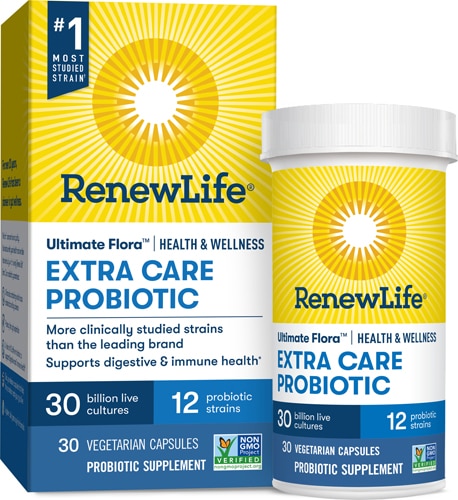[vc_row][vc_column][vc_column_text]Alzheimer's affects
6.7 million people over age 65 in the U.S., and its impact is
on the rise. Having a gene called APOE4 can increase your risk of developing Alzheimer's, but a new study shows that your gut microbiome may influence how this gene affects cognitive health as you age.
The study, published in March 2023 in the journal
Scientific Reports, compared microbiome and genetic data from thousands of people to determine how lifestyle changes may benefit those with higher Alzheimer's disease risk from APOE4.

The gut microbiome and Alzheimer's disease
Previous research suggests a link between poor gut health and Alzheimer's. People with the disease often have
lower microbial richness and diversity, meaning they have fewer numbers and types of microbes in their guts than healthy peers. A decrease in
Bifidobacterium is one notable change that can cause intestinal permeability. Commonly called "leaky gut," this condition may be involved in
Alzheimer's development.
Some gut microbes produce compounds called lipopolysaccharides, which can
pass through the leaky gut barrier and travel through the bloodstream to the brain. Lipopolysaccharides are associated with
brain inflammation and may be a factor in
amyloid plaque formation, which can disrupt brain cell function and lead to cognitive decline.
A gut-gene connection?
The 2023 study shed light on a potential genetic connection between specific bacterial groups and the APOE4 gene that may further influence Alzheimer's risk and development.
APOE4 is a variation of APOE, a gene that affects how your body
processes and transports cholesterol and other fats. About 15% of the U.S. population has the APOE4 variant, which may make them
nine to ten times more likely to develop Alzheimer's than those without it.
Results from the study showed that four particular bacterial groups might "promote [Alzheimer's] development through interaction with" the APOE gene:
Lachnospira and
Veillonella, which can cause intestinal inflammation;
Bacteroides, a lipopolysaccharide producer; and
Collinsella, a pro-inflammatory microbe that may promote leaky gut.
Of the four,
Collinsella had the strongest correlation with APOE4—meaning that people with the gene had more of the bacteria in their guts, a fact that confirms findings from previous research that showed
higher Collinsella levels in Alzheimer's patients. Having too much
Collinsella is also associated with higher LDL cholesterol, which may also
increase Alzheimer's risk.
Change your microbiome to protect your brain
But the researchers also found something encouraging: Several groups of microbes appeared to be protective against Alzheimer's. These microbes, including
Eubacterium nodatum,
Eubacterium fissicatena,
Eisenbergiella, and
Prevotella 9, produce short-chain fatty acids that can
reduce inflammation and strengthen the gut barrier.
Diet and lifestyle changes can increase SCFA-producing bacteria in the gut regardless of genetics. According to a 2022 review of
Alzheimer's intervention studies on humans and mice, the best diet for boosting microbial diversity and SCFA production emphasizes fiber, polyunsaturated fats, and anti-inflammatory compounds called polyphenols.
Dietary changes to reduce Alzheimer's risk
A
Mediterranean dietary pattern includes all these protective factors. Mediterranean diets typically center on vegetables, fruits, whole grains, beans, nuts, and seeds. Of these, vegetables and the unsaturated fats in nuts and seeds appear to be the most protective against Alzheimer's. Plants are also the only source of polyphenols and other compounds that may
prevent inflammation in the brain.
Healthy plant-based eating patterns also reduce saturated fat intake, which is key in managing Alzheimer's risk. Diets high in saturated fat can increase your chances of developing cognitive problems by
60 to 70%, perhaps due to their effect on
microbial richness and diversity, intestinal inflammation, and brain inflammation. Some studies show that saturated fat may pose a
greater risk for people with the APOE4 gene, which makes switching to a diet rich in unsaturated fats even more important.
Comprehensive dietary change appears to be important in reducing Alzheimer's risk. Nutrient in foods interact with each other and with the gut microbiome in complex ways that scientists don't yet fully understand. These interactions may
provide greater protection than supplementing with individual nutrients.
Incorporating more plants into your diet may also help keep your blood pressure under control to further support brain health. High blood pressure can damage the blood vessels in your brain, cause blood clots, and increase your risk for stroke, all of which can affect blood flow and
increase your risk for dementia.
Probiotics and Alzheimer's
Can adding a probiotic compound the benefits of dietary change? Several reviews suggest that probiotic supplements may offer support; however, more research is needed to demonstrate a strong correlation.
According to the current body of research, the most beneficial probiotic microbes appear to be
Bifidobacteria infantis,
Bifidobacteria longum,
Lactobacilli acidophilus,
Lactobacilli plantarum, and
Lactobacilli casei, many of which are found in commercially available probiotic products.
Because you can change your gut microbiome with diet and
influence its function with probiotics, you can reduce your risk of Alzheimer's disease even if you have the APOE4 gene. Delicious recipes like
Roasted Ratatouille Pasta Salad and
Lentil Sweet Potato Skillet are a great way to get more plants on your plate—and shift your gut microbiome toward an anti-inflammatory, SCFA-producing composition that protects your brain.
†These statements have not been approved by the Food and Drug Administration. These products are not intended to diagnose, treat, cure or prevent disease.[/vc_column_text][/vc_column][/vc_row][vc_row][vc_column][vc_text_separator title="Featured Products" border_width="2"][vc_row_inner equal_height="yes" content_placement="middle" gap="35"][vc_column_inner width="1/3"][vc_single_image image="166898" img_size="full" alignment="center" onclick="custom_link" img_link_target="_blank" css=".vc_custom_1684447707636{padding-right: 7% !important;padding-left: 7% !important;}" link="https://www.vitacost.com/renew-life-ultimate-flora-extra-care-probiotic-30-billion-cfu-30-vegetarian-capsules"][/vc_column_inner][vc_column_inner width="1/3"][vc_single_image image="166899" img_size="full" alignment="center" onclick="custom_link" img_link_target="_blank" css=".vc_custom_1684447723778{padding-right: 7% !important;padding-left: 7% !important;}" link="https://www.vitacost.com/beekeepers-naturals-complete-gut-health"][/vc_column_inner][vc_column_inner width="1/3"][vc_single_image image="166897" img_size="full" alignment="center" onclick="custom_link" img_link_target="_blank" css=".vc_custom_1684447740612{padding-right: 7% !important;padding-left: 7% !important;}" link="https://www.vitacost.com/pure-essence-labs-purebiotics-maxima-60-vegetarian-capsules-2"][/vc_column_inner][/vc_row_inner][/vc_column][/vc_row]




